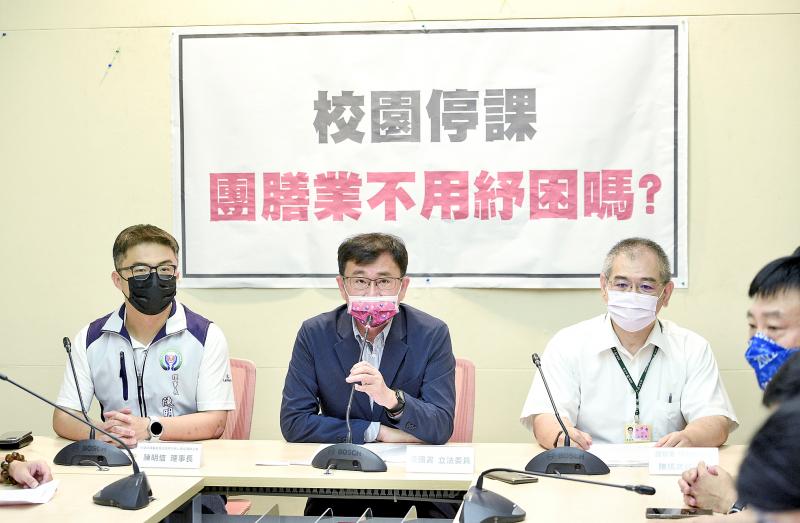The government should offer relief funds to school lunch caterers, whose businesses were disrupted by the Ministry of Education’s policy authorizing schools to switch to virtual classrooms amid the COVID-19 pandemic, Democratic Progressive Party Legislator Huang Kuo-shu (黃國書) said yesterday.
Last year, in-person classes were canceled nationwide after the government raised the COVID-19 alert to level 3, and the government subsidized school lunch caterers for financial losses sustained from food they had bought before the schools were closed, Huang said, adding that they were compensated for lost revenue and salaries as well.
The financial losses that caterers have sustained this year, which they suffered through no fault of their own, was no less than that of last year, he told a news conference in Taipei, adding that the government should keep them in mind when it distributes relief funds.

Photo: Lo Pei-der, Taipei Times
While schools are supposed to compensate caterers for their losses based on the procurement contracts, they generally do not have such funding, he said.
Chen Ming -hsin (陳明信), chairman of a business association for boxed meal operators, said they should be compensated based on their contracts with schools, and a mechanism should be established to settle future disputes.
“As school lunch caterers, we must obtain special permission from schools to offer services and maintain high hygiene standards,” he said. “Last year, we experienced the longest summer vacation of three-and-a-half months. This year, our collective business losses in April and May are expected to exceed NT$400 million [US$13.6 million].”
School lunch caterers serve meals to 1.71 million pupils across the country daily, Chen said, adding that 10 large school lunch caterers have had to close down over the past two years because of inflation and the pandemic.
The government should offer them financial assistance, he said.
“This year, the situation was even more chaotic, because local governments were authorized to decide on their own if school should be closed,” Chen said. “We were often notified on Friday or even on Sunday that schools would switch to virtual classrooms on Monday, but we need to purchase ingredients at least three days in advance and begin marinating meat ahead of time. If schools were closed, we would have to donate the purchased food ingredients to charity groups or throw them away when they rot.”
School lunch caterers should not be asked to bear the losses alone, Chen said, adding that net margins are already low at 3 to 5 percent.
Many of their employees are women returning from a career gap, and they might find other jobs if school lunches were canceled for more than two months, he said.
Chen Hsi-hung (陳錫鴻), deputy director of student affairs and school security division at the ministry’s K-12 Administration, said that schools and school lunch caterers have contracts which stipulate that schools should compensate caterers for all additional costs incurred if they are not liable for the increase in costs.
Schools can also extend their contracts with caterers, he said, adding that the ministry will help schools fulfill the terms of the contracts.

The Grand Hotel Taipei on Saturday confirmed that its information system had been illegally accessed and expressed its deepest apologies for the concern it has caused its customers, adding that the issue is being investigated by the Ministry of Justice Investigation Bureau. The hotel said that on Tuesday last week, it had discovered an external illegal intrusion into its information system. An initial digital forensic investigation confirmed that parts of the system had been accessed, it said, adding that the possibility that some customer data were stolen and leaked could not be ruled out. The actual scope and content of the affected data

‘LIKE-MINDED PARTNER’: Tako van Popta said it would be inappropriate to delay signing the deal with Taiwan because of China, adding he would promote the issue Canadian senators have stressed Taiwan’s importance for international trade and expressed enthusiasm for ensuring the Taiwan-Canada trade cooperation framework agreement is implemented this year. Representative to Canada Harry Tseng (曾厚仁) in an interview with the Central News Agency (CNA) said he was increasingly uneasy about Ottawa’s delays in signing the agreement, especially as Ottawa has warmed toward Beijing. There are “no negotiations left. Not only [is it] initialed, we have three versions of the text ready: English, French and Mandarin,” Tseng said. “That tells you how close we are to the final signature.” Tseng said that he hoped Canadian Prime Minister Mark Carney

POSITIVE DEVELOPMENT: Japan and the US are expected to hold in-depth discussions on Taiwan-related issues during the meeting next month, Japanese sources said The holding of a Japan-US leaders’ meeting ahead of US President Donald Trump’s visit to China is positive news for Taiwan, former Japan-Taiwan Exchange Association representative Hiroyasu Izumi said yesterday. After the Liberal Democratic Party’s landslide victory in Japan’s House of Representatives election, Japanese Prime Minister Sanae Takaichi is scheduled to visit the US next month, where she is to meet with Trump ahead of the US president’s planned visit to China from March 31 to April 2 for a meeting with Chinese President Xi Jinping (習近平). Japan and the US are expected to hold in-depth discussions on Taiwan-related issues during the

President William Lai (賴清德) yesterday bestowed one of Taiwan’s highest honors on Saint Vincent and the Grenadines (SVG) Ambassador Andrea Clare Bowman in recognition of her contributions to bilateral ties. “By conferring the Order of Brilliant Star with Grand Cordon on Ambassador Bowman today, I want to sincerely thank her, on behalf of the Taiwanese people, for her outstanding contribution to deepening diplomatic ties between Taiwan and SVG,” Lai said at a ceremony held at the Presidential Office in Taipei. He noted that Bowman became SVG’s first ambassador to Taiwan in 2019 and